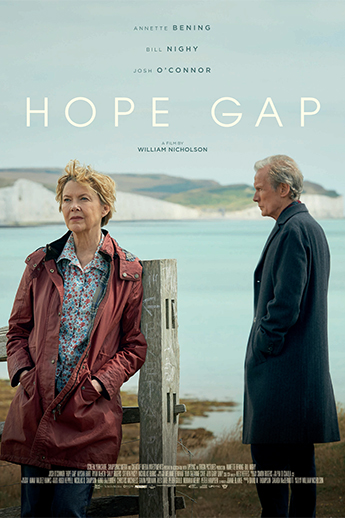
- Starring
- Annette Bening, Bill Nighy, Josh O'Conor
- Writer
- William Nicholson
- Director
- William Nicholson
- Rating
- PG (Canada), PG-13 (United States)
- Running Time
- 100 minutes
- Release Date
- March 6th, 2020
Overall Score
Rating Summary
When it comes to certain films, the right actors can make a bid difference and can sometimes mask a film’s flaws. This was arguably the case with Hope Gap, an older-skewing British romance (or lack thereof) tale giving credence by its three leads who add more depth to a story that may not have been overly deep on the page. As a result, the film is certainly watchable. As parental discord and divorce are themes that have affected many people, whether they take part or are stuck in the middle of it, many audiences will surely relate to the story in one way or another. This film tackles these themes from a more mature perspective that definitely won’t be for everyone but was compelling to watch thanks to its aforementioned performances that would bring out more depth from its characters.
As mentioned, Hope Gap was about an older married couple named Grace (Bening) and Edward (Nighy) whose nearly 30 year marriage takes a dramatic turn when during a visit by their son Jamie (O’Connor), Edward tells him about his intentions of leaving Grace. The signs were there when it came to Grace and Edward’s marriage as there was some unacknowledged tension between them which had been growing for years that each arguably saw differently. They each had love for one another but their relationship had evolved into something much different though not both were still interested in trying to make it work. Meanwhile, their family was not always doom and gloom as the one thing they had in common was their love for Jamie. Unfortunately for him, he would find himself stuck in the middle of his parents and their squabble.
Suffice it to say that Grace did not take Edward’s news, especially the surprise of it all well. She wanted to make her marriage work though it was clear that she and Edward would no longer work together. Grace’s inability to move on would prove to be a moot point in all of this all while Jamie was a begrudging mediator between his parents. Meanwhile, Jamie still had a life of his own but he would have to set it aside for the most part in favor of tending to his parents. While it was clear where it was all going to go, the story was still compelling to watch though in trying to tell all the sides of the story, it did not do either one justice thanks to a lack of character development and a rushed narrative that arguably glossed over the lead up to the breakup.
Hope Gap was a truly beautiful film to look as it truly made the most of the coastal U.K. countryside, including the actual Hope Gap, with plenty of gorgeous shots and a decent score brought plenty of emotion but ultimately, the best part of the film was the great performances from Bening, Nighy, and O’Connor, creating a believable family as Grace, Edward, and Jamie respectively. Their performances are what make the film work, assuming audiences could relate to any of the characters, as they bring out more from what wasn’t overly original to begin with. Bening was an emotional force though her casting in a British film was an interesting choice while Nighy was a decent straight man to Bening. O’Connor was also impressive, however, it was a shame that he didn’t have more to do.
In the end, Hope Gap was a solid British drama that won’t be for everyone but serves a some well-acted escapism.
*still courtesy of levelFilm*
If you liked this, please read our other reviews here and don’t forget to follow us on Twitter or Instagram or like us on Facebook

The EIC of the coincidentally-named keithlovesmovies.com. A Canadian who prefers to get out of the cold and into the warmth of a movie theatre.
Discover more from
Subscribe to get the latest posts sent to your email.
